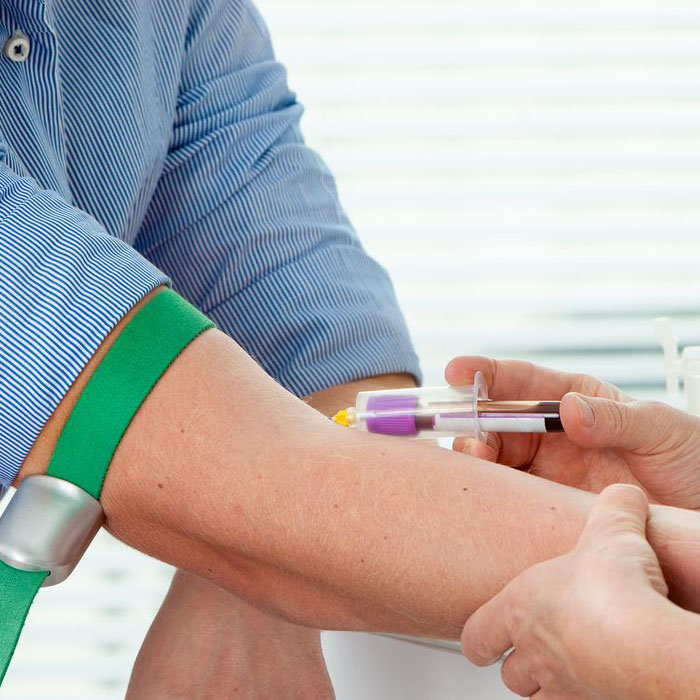Manager laboratory package, Manager premium laboratory package
Constant stress, tense work pace, a sedentary lifestyle, an irregular and unhealthy diet can all increase the risk of developing certain diseases (so-called “manager diseases”). With the help of the manager’s laboratory package, the risk of cardiovascular diseases, metabolic disorders and inflammations present in the body can be eliminated in time.
Fatigue caused by increased strain, sleep disturbances, and the resulting irritability can indicate a variety of illnesses that often lead to decreased performance and, indirectly, increased stress. It is therefore advisable to investigate complaints that appear to be common as soon as they occur, in order to identify and reduce the risk of developing certain diseases in time.
When is it recommended to perform the manager laboratory package?
The manager laboratory package is highly recommended for people over the age of 45, both women and men, not just in case of stressful work. In addition to assessing general health, performing the tests included in the package may also be helpful in preventing the development of diseases.
The manager laboratory package and the manager premium laboratory package contribute to the screening of diseases with more complex, special tests than the extended blood and urine test that is recommended each year.
We offer an extended laboratory package for women and men over the age of 50, which we have compiled regarding age.
What tests does the manager laboratory package include?

Hematopoietic system function
Blood count: used to determine the relative and absolute numbers of formed elements in the blood, red blood cells (RBC), white blood cells (WBC), and platelets (PLT). From this, the specialist can conclude, among other things, anaemia, blood loss, inflammatory processes, disease of the hematopoietic organs and coagulation disorders.
Iron: an important component of haemoglobin, the main oxygen-carrying protein in the blood. In its absence, anaemia develops, reducing the oxygen-carrying capacity of the blood.
Transferrin (total iron-binding capacity): the main transport protein in the blood from which the body’s iron stores can be inferred.
Ferritin: a protein produced by the liver that binds iron. An indicator of the body’s iron capacity, in case of iron deficiency, its level decreases. Elevated levels develop in case of chronic inflammation and cancer.
Cardiovascular system
Homocysteine: normally present in very small amounts in the body, its elevated value can cause vascular disease in any organ, most often the heart. It promotes inflammatory processes and plaque formation, which can lead to the narrowing of blood vessels and the development of cardiovascular disease.
Liver function
Bilirubin: is produced as a yellow breakdown of red blood cells in the spleen, liver and certain lymph nodes. Its levels may elevate in cases of increased red blood cell breakdown, liver disease and biliary obstruction.
GOT (glutamate oxaloacetate aminotransferase): an enzyme involved in the metabolism of amino acids. It is normally present in small amounts in the blood but increases in case of organ damage. Lower GOT values can be found in pregnant women.
GPT (glutamate pyruvate aminotransferase): an enzyme produced in liver cells that shows the damage that has taken place there. Normally, it is also present in small amounts in the blood, increasing in case of damage.
GGT (gamma-glutamyltransferase): an enzyme produced by the liver, pancreas and kidneys. Its value is checked at when examining the liver and bile ducts, the most reliable indicative parameter.

Alkaline phosphatase: an enzyme that helps break down proteins. It usually provides information when testing for liver and bone diseases. A high value indicates liver or bone disease (e.g., osteoporosis), a lower value may be due to hypothyroidism, malnutrition, or anaemia.

Fat and carbohydrate metabolism
Blood sugar: It is used to determine the level of glucose in the blood to help identify diabetes. Elevated levels indicate diabetes.
Cholesterol: Cholesterol is produced in the biggest amount by the liver, but some of it is taken in with food. The cholesterol produced by the liver is essential for the production of bile. Total cholesterol is determined with a laboratory test and the proportions of LDL and HDL cholesterol are also indicated.
- Total Cholesterol: Shows the total amount of LDL and HDL present in the blood serum and their relative proportions.
- HDL cholesterol: the “protective” cholesterol. It transports cholesterol deposited in the blood vessel wall back to the liver, preventing atherosclerosis.
- LDL cholesterol: “bad” cholesterol. It transports cholesterol from the liver to the cells, which can deposit in the blood vessel walls, reducing their flexibility and increasing the risk of atherosclerosis and myocardial infarction.
Triglyceride: components of fats ingested during food intake that supply the body with energy. Ideally, it occurs in small amounts in the body, but in case of excessive carbohydrate intake, our body also produces triglycerides.
Haemoglobin A1C: A long-term blood glucose indicator that can be used to judge the average blood glucose level of the last 6-10 weeks.
Kidney function
Total urine with sediment: This test is used to detect infection, metabolic abnormalities, and kidney disease.
Urea: a breakdown product of amino acids, also an indicator of kidney function. Elevated levels usually indicate kidney failure.
Creatinine (with eGFR): a breakdown product of muscle-derived protein, its blood levels are an indicator of kidney function. Elevated levels usually indicate a problem with kidney filtration, and lower levels develop during pregnancy or with aging.
Uric acid: the end product of the breakdown of purine compounds that enters the circulation during digestion. Purine compounds enter the body with food intake in the form of protein. Two-thirds of uric acid is excreted through the kidneys. Elevated uric acid levels can occur, for example, if the kidney uric acid secretion is inadequate or if there is excessive protein (meat) consumption.

Thyroid function
TSH: We examine the levels of the thyroid-stimulating hormone, TSH, which is produced in the pituitary gland and stimulates thyroid hormone production. If TSH levels are elevated, we talk about hypothyroidism, and if the TSH levels are low, hyperthyroidism may be in the background.
Inflammatory processes
CRP: measures the amount of CRP protein that is produced in liver cells in the event of inflammation. Typically, its levels increase radically in case of bacterial and fungal infections. A laboratory test can only detect inflammation present in the body, but not its exact location. In the presence of inflammation, further testing is recommended considering any complaints.
Westergren (ESR): draws attention to pathological processes in the body, primarily inflammation.
What tests does the manager premium laboratory package include?
The manager premium laboratory package is an extended version of the manager laboratory package that includes insulin testing and a PLAC test for cardiovascular disease, coronary heart disease, and ischemic stroke in addition to the tests listed above.

How do I prepare for the test?
Having an empty stomach is required for the test. A sample delivered in a clean container is required for urine testing.
When is the result expected?
Manager laboratory package: After the 5th working day following the test.
Manager premium laboratory package: After the 17th working day following the sampling.
